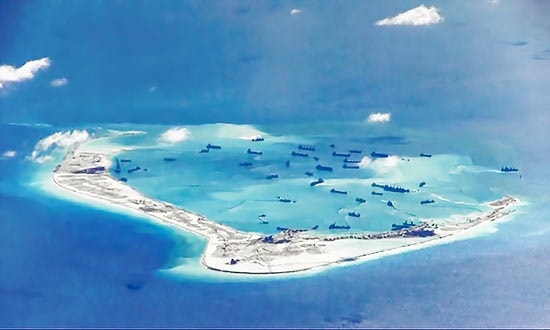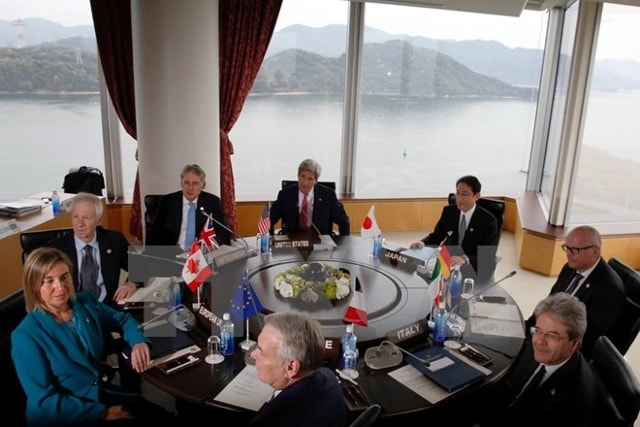G7 strongly opposes provocative actions in the East Sea
(Baonghean) - On April 11, the Foreign Ministers' Conference of the Group of Seven (G7) leading industrialized countries issued a separate statement on maritime security in addition to the "Joint Statement of the Conference" and the "Hiroshima Declaration" to promote nuclear disarmament.
With strong words, the G7 Foreign Ministers' Meeting with Japan as the host expressed a strong stance on maritime security, especially in the East Sea and the East China Sea. This shows that maritime security in Asia has become a top concern of the world's major powers.
 |
| Chinese dredgers illegally conduct dredging and reclamation work on Vanh Khan Reef in Vietnam's Truong Sa archipelago. (Source: Reuters) |
resolute attitude
“Strongly oppose” is the most notable word in the Declaration on Maritime Security that the G7 Foreign Ministers agreed on April 11. Accordingly, the foreign ministers declared strong opposition to all provocative actions in the East Sea and the East China Sea. These are two areas where China is entangled in disputes with countries such as Vietnam, the Philippines and Japan.
The statement also stressed: “We strongly oppose any intimidating coercion or unilateral provocative actions that risk altering the status quo and escalating tensions in these areas.”
In fact, a separate statement on maritime security was first issued at the G7 Foreign Ministers' Meeting in April last year. Subsequently, the G7 Summit held in June also made this clear in the Joint Statement. And at this G7 Foreign Ministers' Meeting, the issue of maritime security was once again mentioned.
In particular, it is easy to see a clear increase in style and vocabulary to express the concern of G7 countries for maritime security issues in the East Sea and the East China Sea.
Specifically, the Foreign Ministers’ Meeting last year expressed concern over unilateral actions that increased tensions, including large-scale land reclamation that changed the status quo in the East Sea. However, just two months later, the G7 leaders at the Summit issued a statement firmly opposing the use of threats, coercion, the use of force or unilateral actions to change the status quo at sea, such as the recent large-scale expansion of artificial islands in the East Sea. And the highest level of “strong opposition” was finally expressed at this G7 Foreign Ministers’ Meeting.
It is no coincidence that the issue of security and freedom of navigation in the East Sea and the East China Sea has become the focus of recent G7 Summits. Although there is no direct dispute, the G7 countries led by the US, Germany, France, etc. all clearly understand the geopolitical role of Asian seas, especially the East Sea. Especially for the US, the administration of President Barack Obama has set a central goal of pivoting to Asia - Pacific during its two terms.
Therefore, any country - including China, if it has aggressive activities, increasing tensions, destabilizing security and maritime safety in the region will inevitably affect the economic interests of the G7 countries. And statements of opposition at G7 conferences are inevitable. For the US, it is also a strategic goal when the government of this country wants to compete for influence with China and create a new mark of the US in the leading dynamic development region, Asia - Pacific.
 |
| Foreign Ministers of G7 countries at the first session of the Conference. (Source: AFP/VNA) |
Japanese mark
At this Foreign Ministers’ Conference, the strong stance in the statement on maritime security is also explained by the host country, Japan. Japan is a country directly involved in disputes with China in the East China Sea. According to the government of this country, once China’s aggressive actions become a precedent in the East Sea, it is not impossible that this country will apply them to the East China Sea as well. This is a scenario that Japan is always wary of.
Next, public opinion is also witnessing a Japan with a foreign policy that has changed a lot since Prime Minister Shinzo Abe took office. In particular, the Abe administration cherishes the desire to expand relations in the region and the world with the leading front being "diplomacy - defense - security". This also means that a Japan that only knows about economy - production will be in the past tense. It shows that Prime Minister Abe has made a historic step by reinterpreting Article 9 of the Constitution to expand the security - defense policies that have constrained Japan for many years.
Ultimately, the big goal that Prime Minister Abe is aiming for is a new Asian security architecture in which Japan plays an important part. And China is a major rival on this path of Prime Minister Abe.
Therefore, promoting a strong statement on maritime security issues targeting China at this conference is a necessary step by Prime Minister Abe, in preparation for the G7 Summit which will also be held in Japan at the end of May. This is also a strong warning to China if it continues to take aggressive actions that violate international law in the waters of the Asian region.
Although it still tries to criticize and oppose the G7 statements, perhaps the Beijing government is feeling lost in the face of pressure from the international community on maritime security issues. And that an adjustment in its new maritime policy is what China needs to do at this time.
Phuong Hoa
| RELATED NEWS |
|---|
